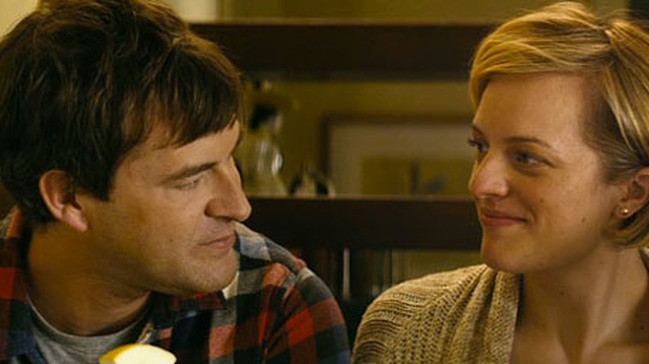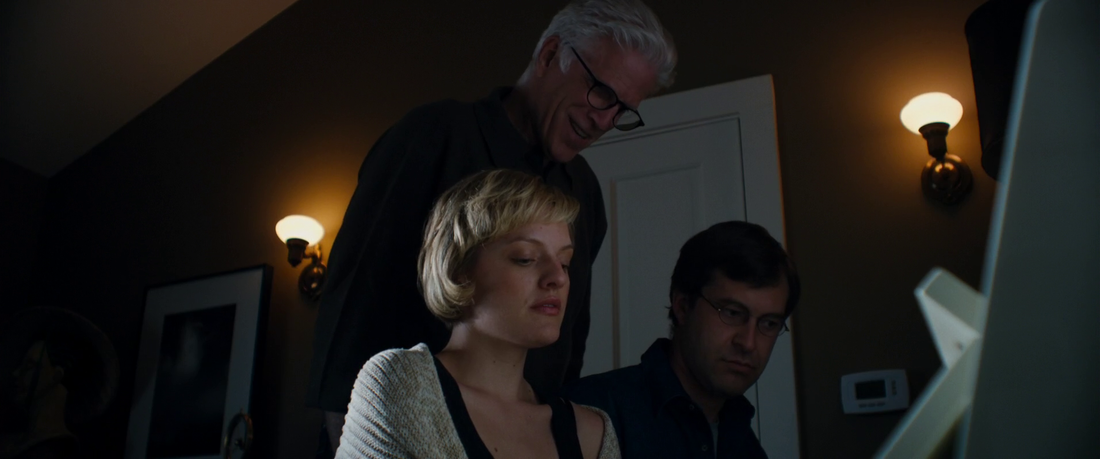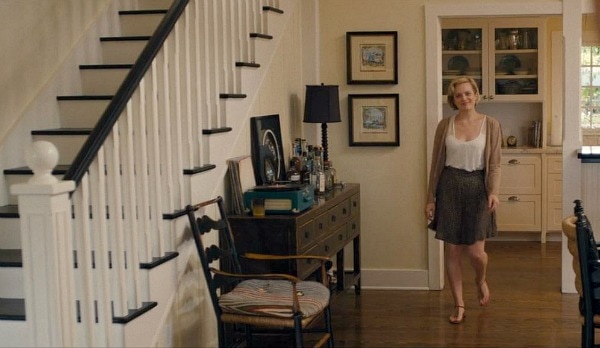Let's Not Talk About It: Spoilers in Films Like The One I LoveBy Perri Chaustilik The rise of the Internet has made sharing and communicating about films much easier. It has also made the world both more sensitive to and better at discovering “spoilers,” a term for anything that gives away details about a movie. Some filmmakers, like the creators of The One I Love (McDowell, 2014), specifically try to hide details from uninitiated audiences. They based their films off of classics from the past with surprising endings like The Sixth Sense (Shyamalan, 1999) and chose to emulate the authentically surprising experiences these films provided by keeping details hidden. Their understandable yet possibly unnecessary decision brings to mind an important and rarely examined question in film theory. Do spoilers actually “spoil” stories? Despite the need for more research, it is worth examining because of what it reveals about how people interact with stories.
The One I Love is a strange but intriguing multi-genre film with elements of romance, sci-fi, drama, etc. It involves a couple named Sophie and Ethan who are on the brink of ending their marriage. The magic in their lives is gone and the husband has committed infidelity. Their happiness exists only in the memories they unsuccessfully attempt to create. In desperation, they go to a strange therapist who has numerous techniques for attempting to bring them together, such as playing the same note on the piano. When none of his plans work, he recommends the couple go to a retreat cabin that has always worked well for his other patients. There are already signs of danger in these early stages, such as the fact that he omits the word “feeling,” but Sophie and Ethan decide to go anyway (D'Angelo, 2014). The arrival at the resort serves as the point at which the film becomes difficult to explain without spoiling anything. Fortunately, understanding its basic core does not require an in-depth summary. When the couple see the beautiful home, they decide to relax, explore, have fun, and even smoke pot. They especially enjoy the guesthouse together, but this happiness is short-lived as the story soon veers into sci-fi territory. Sophie returns to the main house the next morning and finds Ethan asleep on the couch. He does not remember the night she says she had with him or believe her claim that they made love in the guesthouse. They are both frightened and leave but are so curious that they come back to investigate, a plot point that does involves some suspension of disbelief (D'Angelo, 2014). Eventually, the couple discovers that every time they enter the guesthouse alone, a more “perfect” version of their spouse is living within. They keep returning one by one to discover how this is possible. To say any more about what they find would spoil the entire film. The creators of The One I Love are the sort who believe in a spoiler-free environment. They wanted to closely guard their project and made sure to keep the true depths of their twisting plot a secret. They refused to reveal almost anything in interviews and created a spoiler-free trailer in an age where trailers often reveal too much (Guirox, 2014). Their efforts were successful and supported, but whether they actually helped the project itself is unclear.
Because of its many twists and turns and the depth of its narrative, there are multiple aspects that could be spoiled for first-time viewers of The One I Love. Rather than listing them all, it is more efficient to group them into categories. These same categories also apply to spoilers in other films more generally. Most viewers who intentionally try to discover something about a film do so because they have a question they want answered. These could be called “question-and-answer spoilers” where abating curiosity about some aspect of the film may lead to knowing too much. This statement applies to The One I Love in more than one instance. What is actually in the guesthouse? Who are these mysterious alternate versions of Ethan and Sophie? Was the entire experience a dream? The answers to each of these questions qualify as spoilers. They are provided in the end but meant to be revealed through the progress of the plot, not by a blabbering friend or overly in-depth online review. Question-and-answer spoilers can be dangerously detrimental, but their effect depends on the importance of the question to understanding and/or enjoying the film. Similar to the category of general question spoilers, there is also the “how” spoiler. It is the most specific question spoiler of all. Sometimes, if only one small element of a film (such as a twist ending) is revealed, it can still be enjoyed if the process to reaching that point is kept secret. Imagine a film where a seemingly innocent character is revealed to be a murder. If a potential viewer finds out this fact but not the way the police catch the criminal, they may still want to see it to find out how the events play out. If they do find out how the murderer gets caught, that is a “how” spoiler. The “how” spoiler may be the most dangerous and have the highest potential for “ruining” films. Rather than focusing on what occurs, this type of spoiler details at least part of the plot's progression. It diminishes the enjoyment of discovering how a story unfolds, which is a major impetus to film viewership. This is likely what the creators of The One I Love wanted to avoid; the only thing potentially worse than knowing what Sophie and Ethan find in the guesthouse before watching the film is knowing how they discover it. There are also “plot-point spoilers,” however, that simply reveal something that happens in the story. There are examples of these in The One I Love, including Sophie falling in love with the guesthouse Ethan, real Ethan tracking her when he gets suspicious, guesthouse Ethan’s painting, etc. They do not mean or reveal as much out-of context as they do within the film, making them the least dangerous. Despite the bevy of potential examples in its plot, The One I Love is not necessarily more likely to be spoiled than any other film. Blockbusters generate word of mouth at a higher rate than indie pieces due to higher viewership, better promotion budgets, etc. The One I Love is also deep and twisting enough to keep some viewers from understanding it enough to “ruin” it for others online or in person. These elements, when combined, have kept the film from joining the realm of some of its unfortunate predecessors who always seem to have their ending spoiled. Twists and turns are central to the plotline and the very intention of a piece like The One I Love. Thus, it is reasonable for the creators to take extra effort to hide their project’s most crucial details in carefully planned trailers and posters for the diligent fans to find. It is heavily inspired by the famous sci-fi mystery series The Twilight Zone (Sterling, 1959-1964), and Ethan directly calls out these similarities. It was the sort of series where, even if it was not always clear what was happening, going into too much detail with friends who had not yet seen an episode could still have spoiled it for them. The same is (or at least was) true of more films that influenced The One I Love, with The Sixth Sense as a notable example due to the way knowledge of its ending changes one’s perception of the story. The modern age makes defining concepts difficult, including spoilers. Giving away the endings to some of the major “twist ending” films The One I Love is inspired by would definitely have been considered a spoiler at the time (and most likely a faux pas). Today's audience has a peculiar view towards giving away content. On the one hand, some viewers intentionally spoil themselves, searching for secrets online before seeing a film. They may also post the important details they find before or after their first viewing for everyone to see. On the other end of the spectrum, some moviegoers are sensitive to having the tiniest details revealed (Gray, 2010). Rather than seeking them out, they will stay away from social media pages or inconsiderate friends that may reveal details about a film they have not yet seen. “Spoiler alert” is a term that appears frequently on cautious websites and in everyday conversation to warn those who have not seen a film that a reveal is in store. This divide in the community is evidence of the need to study the ways spoilers affect perceptions of stories. While it may be difficult to describe spoilers, it is worth examining whether the act of revealing movie details in and of itself has any effect on a viewer’s enjoyment of a film and why this may be the case. One possibility can be found when examining the act of rewatching a film. Once the twist is revealed the first time, a viewer may enter detective mode the second time through and search for “clues” that revealed its presence. Filmmakers usually include foreshadowing of their later plot points, so this type of investigation will probably be rewarded. Spoilers expedite this process and send a viewer looking right away. Whether this is a benefit or a detriment may depend on the viewer, the film, and the reveal itself. Perhaps one of the reasons the creators of The One I Love avoided giving out spoilers is that their film was always meant to be a sort of detective case from minute one. They did not want to rely on spoilers to activate the viewer's brains. Another potential effect of spoilers is that they alter the viewer’s perception of a story. Return to the previously mentioned image of a film that means to portray a character as docile until the end when it is revealed he was the serial killer the police were searching for all along. If someone watches this film and has the climax spoiled for them before watching the film. the viewer will never get a chance to see the buildup and imagine them as innocent. Whether this is a benefit or not may depend on the viewer, but it may be detrimental more often than it is helpful because it narrows the film’s capabilities. If the ending is spoiled, it can only make a viewer see something one way (evil) rather than two (innocent then evil). This could be said of The One I Love as well; it is a far more enjoyable adventure when one can discover the true depths of its story for themselves. The makers of The One I Love were careful not to reveal too much about their film for those who had not yet seen it, believing it provides a more enjoyable experience for the viewer. They even kept details out of their trailers in an age where trailers revealing too much is a common complaint (Guirox, 2014). Was their decision a wise one? This is a question that varies based on opinion. Despite potential negative effects, in general spoilers have not been proven to “ruin” stories. Jonathan Leavitt and Nicholas Christenfield did a study of how people reacted to stories with or without spoiler paragraphs in the beginning and found some intriguing results. Suspense is not critical to story enjoyment, and in each type of story the participants read (ironic twist, mysteries, and evocative literature), they preferred the one that was spoiled (Leavitt and Christenfield)! This suggests that the tendency to seek out spoilers is actually more common than the desire to avoid them. However, one study is not enough to provide definitive proof. More research is still needed to support this association. Schema discrepancy theory suggests that increased predictability can increase positive responses to a story, though this depends on the initial level of uncertainty (Leavitt and Christenfield). Perhaps what this suggests, along with the results of the previously mentioned study, is that there is no clear answer yet as to whether spoilers actually “spoil” stories. It depends more on the type of story it is, what purpose it hopes to achieve, and how fans react to it. The producers of The One I Love certainly feel that their film is better when the path of its plot is protected from first-time watchers. Whether this is true or not, and how much it applies to other films, is a matter of opinion and a worthwhile course for further study. Films are built on stories. Spoilers affect not how a story is written but how a viewer interacts with it. They may become more or less interested in a story they know about beforehand. While watching, they may spend their energy looking for “proof” of something they read online instead of letting the narrative run its course. Their views on characters and plot points will most likely change as a result of what the spoiler revealed., Stories are usually written to slowly build up and reveal important aspects later, but endings are unfortunately spoiled more often than almost anything else. Still, the exact ways that a spoiler affects a viewer are difficult to define as each person is unique, but further examination could provide valuable insight. “Spoiler” and “spoiler alert” have become such a part of the “slang” of film buffs that the lack of study devoted to them by film theorists is somewhat surprising. The Internet age is the best time to begin this examination, however, because of the way it increases the spoiler's mobility. Even a poorly made film can have a review that goes too in-depth, revealing plot points, answering all of the viewer’s questions or, even worse, describing the course of the plot. Although spoilers do not always ruin enjoyment of a film (and some research suggests it might actually contribute favorably), some filmmakers support the “spoiler-free” side of the debate. This applies to the promotion campaign of The One I Love in particular, with its simple trailer, poster, and interviews. Whether this was a benefit or not is a matter of opinion, but their film’s indie status and complicated nature makes it less likely to have been spoiled regardless of their efforts. Whether filmmakers should go to the trouble to protect their project’s secrets is a worthwhile field of study for what it could add to the current understanding of viewer-narrative interaction. Works Cited: D'Angelo, Mike. "To Explain the True Premise of The One I Love Would Be to Spoil Its Fun." The A.V. Club. The A.V. Club, 21 Aug. 2014. Web. 04 May 2017. Gray, Jonathan. Show Sold Separately: Promos, Spoilers, and Other Media Paratexts. New York: New York UP, 2010. Print. Guirox, Jack. "Why The Makers of ‘The One I Love’ Don’t Want You To Know What It’s About." Filmschoolrejects. N.p., 14 Aug. 2014. Web. 17 Apr. 2017. Kassel, Matthew. "Couples Therapy: ‘The One I Love’ Turns Into a Schizoid Hodgepodge." Observer. Observer, 14 Aug. 2014. Web. 04 May 2017. Leavitt, Jonathan D. "Story Spoilers Don't Spoil Stories." Psychological Science 22.9 (2011): 1152-154. JSTOR. Web. 10 May 2017 The One I Love. Dir. Charlie McDowell. 2014. |





